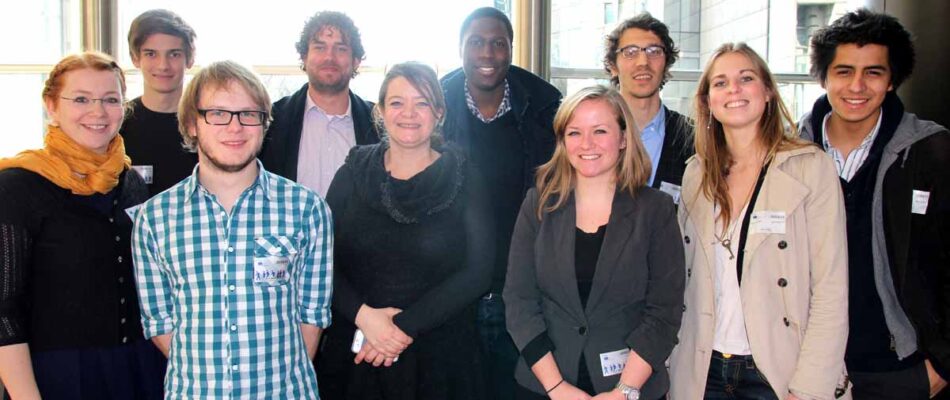
MEPs listen to students’ worries about a loan scheme
BRUSSELS – Mrs. Isabelle Thomas, Member of the European Parliament (S&D), understands the concerns that European students have regarding the introduction of a European Loan Guarantee Facility. She thinks it might be a slippery slope for the European Union, as it might change the perception of the Erasmus programme and make it possible to gradually replace scholarships with loans. It would also increase the indebtedness of students, which she says is: “Not something we should wish for with 25 per cent of people under 25 unemployed already, and in some countries even 50 per cent. The EU’s responsibility is to give other possibilities for young people than be in debt before entering the labour market.”
Students’ representatives from Belgium, France, Germany, Italy and the Netherlands expressed their harsh opposition to the idea of a loan scheme at a roundtable organised by Mrs. Thomas and the European Students’ Union (ESU) on Wednesday 20 February at the European Parliament in Brussels. They all agreed that the European Commission’s proposal for the facility had several shortcomings and that it would be an unwise step to implement such a structure.
Students quoted
“Whether loans are acceptable or not depends on how we view education and its purpose. It shows the solidarity of citizens if they can contribute to the financing of higher education as a public responsibility. How can loans contribute to enhancing student mobility and European integration?” asked David Méndez Yépez, President of the federation of the French-speaking students in Belgium (FEF).
Marie Pilliere, Vice-President of the French students’ union FAGE, said that studies had shown that 40 per cent of students in France would prefer to work than accept loans to finance their studies. “Students from higher socio-economic backgrounds can pay their fees more easily. Thus, it would be a social discrimination to provide loans to the others,” she said.
Tim van den Brink, from the Dutch student union LSVb, said that the average debt of Dutch students was 15 thousand euros upon their graduation even though the loan conditions were favourable. “There is currently a debate in the Netherlands on creating a fully loan-based support system instead of grants. That example proves how the partial introduction of loans can slowly turn into a full based loan support system,” he said.
Matteo Giacomi, from the National Union of Students in Italy (UdU), explained how attempts to introduce a loan scheme nationally in Italy had already failed due to no interest and how students could not be expected to repay their debts in times where unemployment is close to 30 per cent. “Loans would not present a real opportunity due to the drastic prospective of the labour market. The message of Erasmus is to create opportunities for all without the pressure of having to repay or creating mistrust,” he said.
The loan scheme in brief
These loans would be made available as a part of the Multiannual Financial Framework 2014 to 2020 if they will be approved. The European Investment Bank would be made responsible for finding banks willing to offer loans to students at low rates providing the banks with financial guarantees instead in case of any credit defaults. Students that want to apply for a full Masters’ degree in another EU country would be eligible to request for such loans.
Fabrice Comptour, a Member of the Cabinet of the European Commissioner for Education, Culture, Multilingualism and Youth, attended the round table but claimed that the loan scheme would be a valuable addition to enhance student mobility, a point of view that students disagreed with.
Background information
A trilogue including representatives from the European Parliament, the Council and the Commission took place last week. On 20 February, the Education Committee of the Council met to discuss the Erasmus proposal and its position towards it.
Negotiations on the budget for the Multiannual Financial Framework for 2014-2020 are on-going and it is too early to say how much Erasmus for all will receive in the end. The European Commission originally proposed allocating 19 billion euros to the programme taking inflation over the time period into account. However, it might be closer to 17 billion or lower following the decision of the European Council on 8 February. Some parties at the European Union have shown willingness to scrap the 800 million euros that are supposed to be invested in the loan scheme to preserve other parts of Erasmus for all.
Please find here a non-paper ESU issued in 2012 about the loan scheme.

Taina Moisander, Vice-Chairperson of ESU, explained how the financing structure of education had changed in the past decades.

Mrs. Isabelle Thomas hosted the debate on the loan scheme and expressed her concerns about the Commission’s proposal.

Mr. Fabrice Comptour, from the European Commission, defended the proposal against heavy criticism from students.

Mrs. Isabelle Thomas and Mr. Fabrice Comptour had an excellent debate on the pros and cons of introducing a loan scheme for students.

Students from Belgium, France, Germany, Italy and the Netherlands all explained why they were worried about the proposal.
— END —
For more information, please contact:
Taina Moisander, ESU Vice-chairperson: +32/479.591.499 // taina@esu-online.org or Robert Hlynur Baldursson, ESU Communications Manager: +32/473.669.894 // robert@esu-online.org

The European Students’ Union, headquartered in Brussels, is the umbrella organisation of 47 national unions of students from 39 European countries. ESU represents and promotes the educational, social, economical and cultural interests of students at the European level. Through its member unions, ESU represents over 11 million students in Europe. To find out more about ESU, follow us on Twitter @ESUtwt, check out or Facebook page or visit www.esu-online.org. ESU celebrates its 30th anniversary in 2012.
